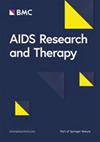Research priorities in HIV, aging and rehabilitation: building on a framework with the Canada-International HIV and Rehabilitation Research Collaborative
IF 2.1
4区 医学
Q3 INFECTIOUS DISEASES
引用次数: 0
Abstract
In 2016, the Canada-International HIV and Rehabilitation Research Collaborative established a framework of research priorities in HIV, aging and rehabilitation. Our aim was to review and identify any new emerging priorities from the perspectives of people living with HIV, clinicians, researchers, and representatives from community organizations. We conducted a multi-stakeholder international consultation with people living with HIV, researchers, clinicians and representatives of community-based organizations. Stakeholders convened for a one-day Forum in Manchester, United Kingdom (UK) to discuss research priorities via a web-based questionnaire and facilitated discussions. We analyzed data using conventional content analytical techniques and mapped emerging priorities onto the foundational framework. Thirty-five stakeholders from the UK(n = 29), Canada(n = 5) and Ireland(n = 1) attended the Forum, representing persons living with HIV or representatives from community-based organizations(n = 12;34%), researchers or academics(n = 10;28%), service providers(n = 6;17%), clinicians(n = 4;11%); and trainees(n = 4;11%). Five priorities mapped onto the Framework of Research Priorities across three content areas: A–Episodic Health and Disability Aging with HIV (disability, frailty, social participation), B-Rehabilitation Interventions for Healthy Aging across the Lifespan (role, implementation and impact of digital and web-based rehabilitation interventions) and C–Outcome Measurement in HIV and Aging (digital and web-based rehabilitation health technology to measure physical activity). Stakeholders indicated methodological considerations for implementing digital and web-based rehabilitation interventions into research and practice and the importance of knowledge transfer and exchange among the broader community. Results highlight the sustained importance of the Framework of Research Priorities and provide further depth and areas of inquiry related to digital and web-based rehabilitation interventions and technology aging with HIV.艾滋病毒、老龄化和康复方面的优先研究事项:以加拿大-国际艾滋病毒和康复研究合作组织的框架为基础
2016 年,加拿大-国际艾滋病与康复研究合作组织建立了艾滋病、老龄化与康复研究优先事项框架。我们的目的是从艾滋病病毒感染者、临床医生、研究人员和社区组织代表的角度出发,审查和确定任何新出现的优先事项。我们与艾滋病病毒感染者、研究人员、临床医生和社区组织代表进行了一次多方利益相关者国际磋商。利益相关者在英国曼彻斯特召开了为期一天的论坛,通过网络问卷和协助讨论的方式讨论研究重点。我们使用传统的内容分析技术对数据进行了分析,并将新出现的优先事项映射到基础框架上。来自英国(n = 29)、加拿大(n = 5)和爱尔兰(n = 1)的 35 名利益相关者参加了论坛,他们分别代表艾滋病病毒感染者或社区组织代表(n = 12;34%)、研究人员或学者(n = 10;28%)、服务提供者(n = 6;17%)、临床医生(n = 4;11%)和受训人员(n = 4;11%)。五个优先事项与三个内容领域的研究优先事项框架相对应:A-艾滋病毒感染者的偶发性健康和残疾老龄化(残疾、虚弱、社会参与),B-跨生命周期健康老龄化的康复干预(数字和基于网络的康复干预的作用、实施和影响),C-艾滋病毒和老龄化的收入测量(数字和基于网络的康复保健技术,以测量体育活动)。利益攸关方指出了在研究和实践中实施数字和网络康复干预措施的方法考虑因素,以及在更广泛的社区之间进行知识转让和交流的重要性。研究结果突出了研究重点框架的持续重要性,并提供了与数字和网络康复干预措施以及艾滋病毒老龄化技术有关的进一步深度和调查领域。
本文章由计算机程序翻译,如有差异,请以英文原文为准。
求助全文
约1分钟内获得全文
求助全文
来源期刊

AIDS Research and Therapy
INFECTIOUS DISEASES-
CiteScore
3.80
自引率
4.50%
发文量
51
审稿时长
16 weeks
期刊介绍:
AIDS Research and Therapy publishes articles on basic science, translational, clinical, social, epidemiological, behavioral and educational sciences articles focused on the treatment and prevention of HIV/AIDS, and the search for the cure. The Journal publishes articles on novel and developing treatment strategies for AIDS as well as on the outcomes of established treatment strategies. Original research articles on animal models that form an essential part of the AIDS treatment research are also considered
 求助内容:
求助内容: 应助结果提醒方式:
应助结果提醒方式:


